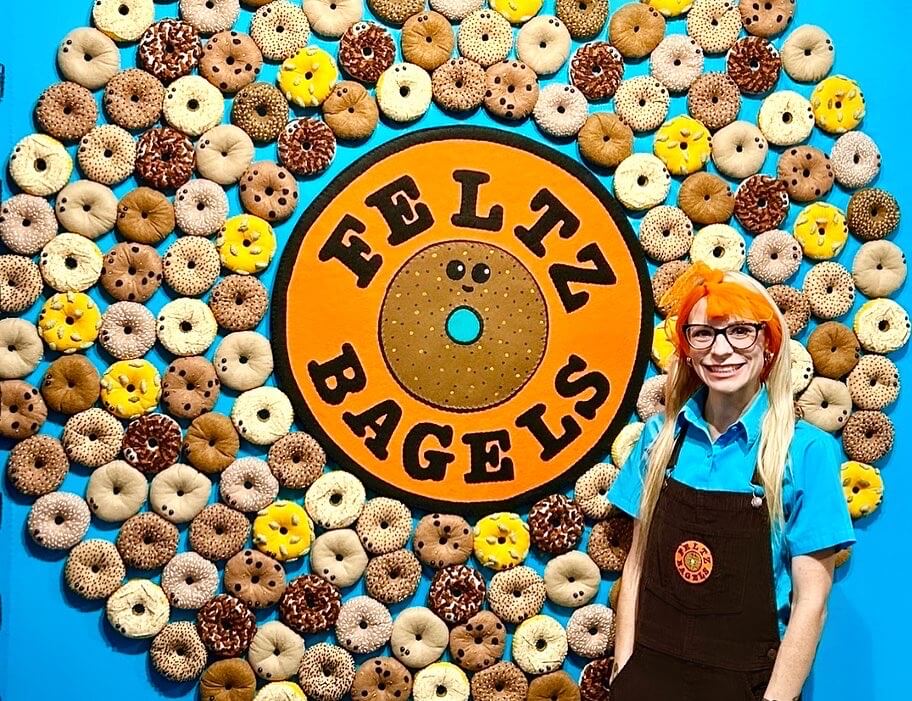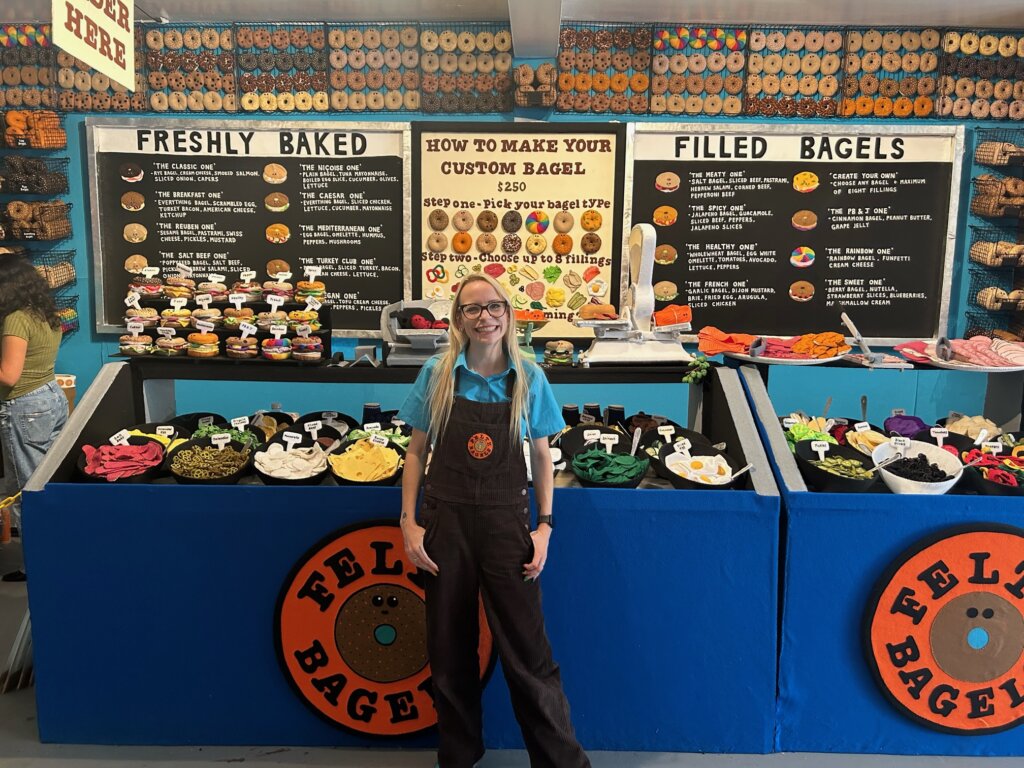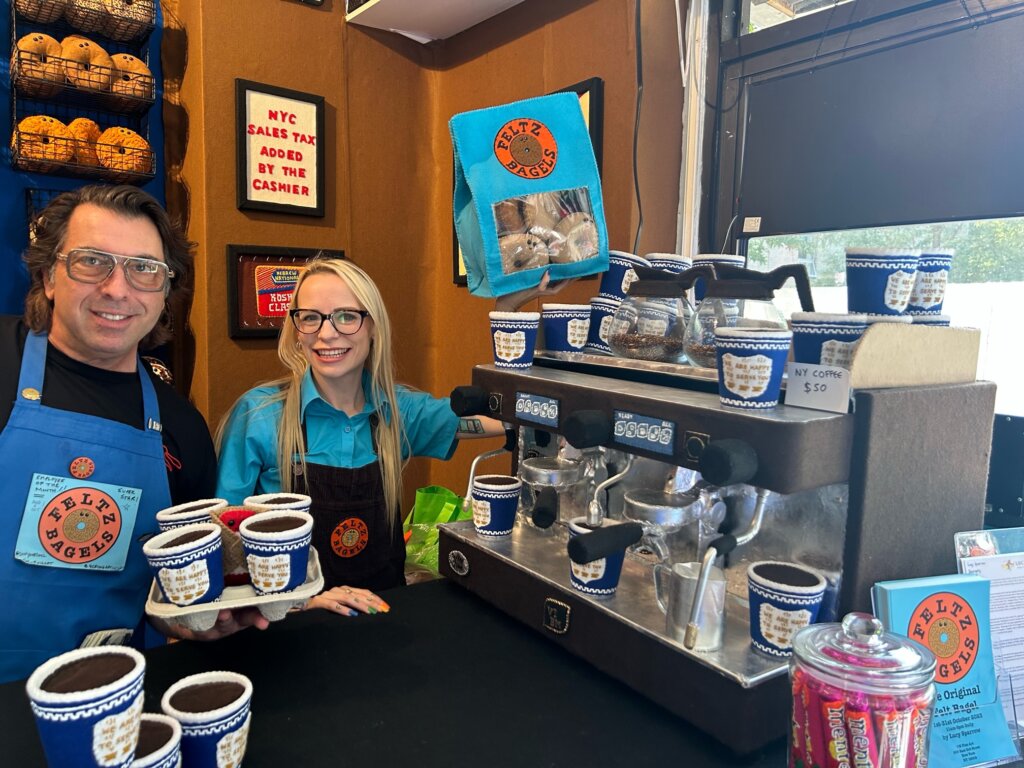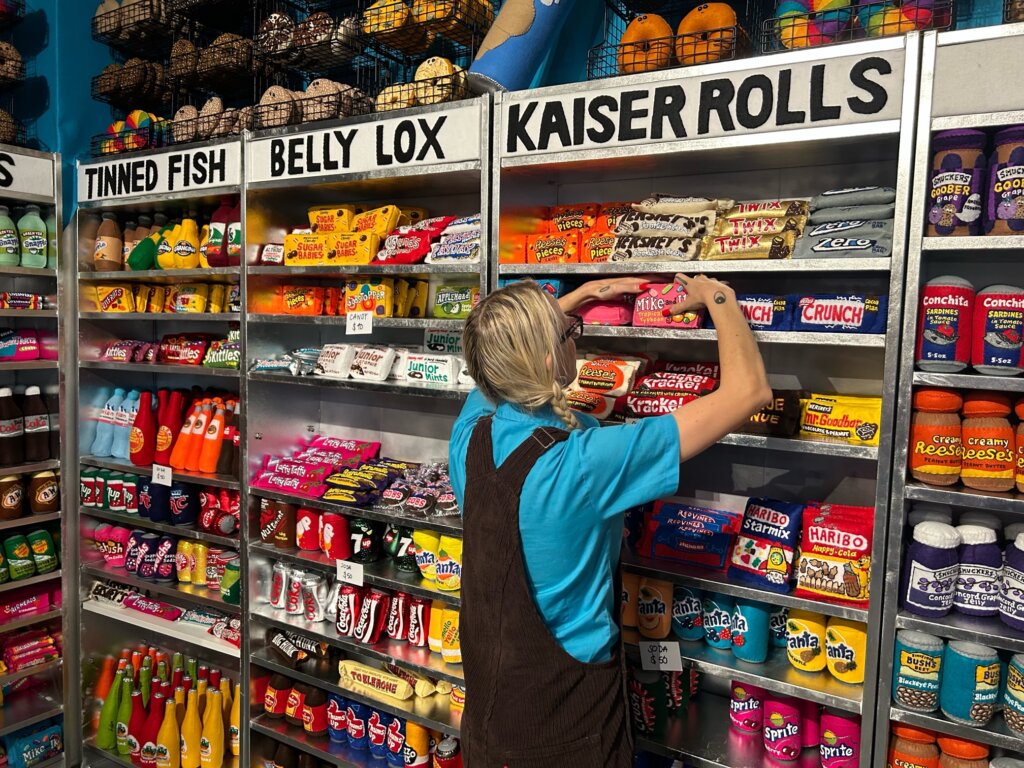The most beautiful new bagel shop in New York doesn’t have any bagels in it
British artist Lucy Sparrow’s Lower East Side pop-up, Feltz Bagels, is made completely out of felt and paint, down to the last sesame seed

Graphic by Angelie Zaslavsky
It’s a familiar sight in New York: a neon “Hot Bagels” sign hanging in a shop’s window, cluing passersby into a storefront full of fresh, chewy bagels and their yeasty, mouth-watering aromas.
But if you find yourself lured in by the bright “Hot Bagels” sign on 209 East 3rd St. this month, you’ll enter a room that looks like a schmear shop — baskets full of everything bagels, a deli counter stocked with flavored cream cheeses and a row of black-and-white cookies— but doesn’t smell at all like food.
That’s because everything, from the tomatoes to the Greek diner coffee cups, is handmade from felt and paint.
Welcome to Feltz Bagels, artist Lucy Sparrow’s immersive take on a New York bagel shop. The space even has a non-functional coffee maker and a cash register where customers can purchase just about every fuzzy object in the room, including a wide variety of bagels that all come with small, painted smiley faces.
The project is the latest in Sparrow’s series of felt storefronts, which include a New York bodega, a London cornershop and a Miami Cuban sandwich bar.

Sparrow started this exhibition the same way that she started her others: First, she decided on a location — an art gallery on the Lower East Side, her favorite neighborhood of New York — then, she decided what type of shop she wanted to emulate. Then, she thought, “What’s more New York than anything else? And I was like, ‘Bagels.’”
Next, Sparrow went on a research trip spanning about 30 bagel shops and delis, a process that went beyond the enviable task of eating ring after ring of baked and boiled dough. When she visited a bagel purveyor, she would take photos of “every inch of the store,” she said, then created a “massive spreadsheet” with every detail that she wanted to replicate: gray bars of Philadelphia cream cheese; the brands of potato chips on offer; a sign that says “NY sales tax added by the cashier.”
She and her team of three employees set about producing as many of these details as possible out of felt and paint in her Suffolk, England studio; Sparrow estimates that she put in nine months of 14-hour days with few days off to bring Feltz Bagels into being.

The result, shipped over the Atlantic Ocean, is what Sparrow called, in a conversation with a customer, “a tribute to bagel culture in the Lower East Side, and everything connected to it.” Visitors can order custom-made bagel sandwiches at the counter, and Sparrow or an associate will use a glue gun to stick two plush bagel halves around fabric bagel toppings like cream cheese, eggs or tomatoes. Sparrow says customers are just as particular about their specifications for felted bagels as they are for hot, edible ones.
The pop-up’s snuggle-ready wares go beyond bagels, also honoring bodega snacks and Jewish-American classics. One wall is stocked with felted replicas of the types of condiments and snacks one might find at a corner store, such as ketchup bottles and potato chips; another wall is lined with Jewish foods and Judaica, including a Passover seder plate, a menorah and a supersized, felt take on a bottle of gefilte fish.
Sparrow, who is not Jewish, says she has “learned so so much” about Jewish culture through the project. At first, she thought her felt bagels would be a good fit next to her Seder plate and matzah box; then she learned about prohibitions against leavened bread on Passover. “Nope,” she said, laughing. “No bagel in the Passover display. Absolutely not.”
And though Sparrow is mindful of tradition, she also playfully upends it in a room in the shop’s back corner: the space is outfitted as a secret den for an illicit side-hustle — the foil to the cute, idealized version of a bagel shop in the rest of the store. Shelves are stocked with felted liquor bottles (Manischewitz included), dime bags of marijuana and a wad of cash leftover from when Sparrow created a bank vault and a getaway car full of paper currency, gold bars and Old Masters paintings in a London art gallery. There are even links of pork sausage.

Sparrow said that she “spoke to a lot” of Jewish friends before introducing the forbidden meat into the back room. “I said, ‘Would this be funny? Or would it be offensive? They were all like, ‘Oh my god, it’s hilarious.’”
Sparrow’s whimsical take on bagels, New York and Jewish cuisine has resonated with customers like Caren Freigenberg, 67, who visited on a recent weekday. She read about Feltz Bagels in an article online, and thought that the idea of a bagel store in which the contents were entirely made of felt “sounds like an incredible thing.” Freigenberg drove from her boyfriend’s home in Fort Lee, New Jersey to the Lower East Side to see the exhibit, and when asked why she made the trip, she said, “What can I tell you? Because I’m Jewish.”
Sparrow told me that some people come in looking for an actual bagel. “Sometimes we play along,” she said. “But if they look a bit stressed, we’re like, ‘No, sorry, this is an art exhibit.’”

















